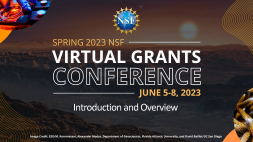Spring 2023 NSF Virtual Grants Conference: NSF Intro and Overview
Spring 2023 NSF Virtual Grants Conference: Proposal Preparation
Proposal Preparation
1:00 - 2:30pm EST Monday, June 5, 2023
NSF staff will review how and when to prepare a proposal, including discussion of what constitutes a project and a proposal of high quality. Presenters will discuss do’s and don’ts, recent procedural changes, as well as the various sources of NSF programmatic opportunities.
Presenters: Jean Feldman, Bogdan Mihaila, Eleanor Sayre
Spring 2023 NSF Virtual Grants Conference: Merit Review Process
Merit Review Process
3:00 - 4:15pm EST Monday, June 5, 2023
NSF Program Officers will discuss the philosophy of merit review and how it works, as well as ad hoc and multi-tiered reviews. Presenters will also cover the role of the Program Officer, timing of proposal submissions, reviewer selection, release of reviewer comments, and conflict-of-interest issues related to merit review.
Presenters: Ellen McCallie, Colette St. Mary, Karen Santoro
Spring 2023 NSF Virtual Grants Conference: Award Management
Award Management
11:00 - 12:30pm EST Tuesday, June 6, 2023
This session will address award requirements and conditions and will outline the responsibilities of those involved in the award process–principal investigators, grantee institutions, Program Officers, research administrators, and agency grants officials.
Presenters: Elizabeth Dehart, Vanessa Richardson, Jeff Vieceli
Spring 2023 NSF Virtual Grants Conference: Office of the Inspector General
Office of the Inspector General
1:00 - 2:00pm EST Tuesday, June 6, 2023
Staff from the Office of the Inspector General (OIG) will discuss the roles and responsibilities of the OIG, as well as how it serves the NSF customer communities. Issues arising from current audits and investigations will also be covered.
Presenters: Jeremy Hall, Dwayne Meadows, Brian McCarthy, Matias Rosner Ortiz
Spring 2023 NSF Virtual Grants Conference: Faculty Early Career Development Program (CAREER) - Proposal Submission Logistics
Faculty Early Career Development Program (CAREER) - Proposal Submission Logistics
3:00 - 4:00pm EST Tuesday, June 6, 2023
This session will include an overview of CAREER proposal submission logistics presented by a representative from NSF’s Division of Information Systems. A demo of how to prepare a CAREER proposal in Research.gov, review of the system-related requirements in the CAREER proposal submission timeline guidance, and a Q&A segment will be included.
Presenter: Stephanie Yee
Spring 2023 NSF Virtual Grants Conference: NSF Financial Management Update
NSF Financial Management Update
3:00 - 4:00pm EST Tuesday, June 6, 2023
NSF’s Payment and Analytics Branch, within the Division of Financial Management, will provide an overview of their financial management practices and operations, as well as new initiatives within the branch. Topics covered include awardee financial reporting and reimbursement responsibilities, best practices and frequently asked questions, recurring monitoring activities, critical fiscal year timelines, as well as new innovations in grant monitoring. This session will be helpful to both new and current NSF awardees to learn more about post-award financial activities at NSF.
Presenters: Dorothy Battle, Justin Poll
Spring 2023 NSF Virtual Grants Conference: Directorate for Social, Behavioral and Economic Sciences (SBE)
Directorate for Social, Behavioral and Economic Sciences (SBE)
11:00 - 12:00pm EST Wednesday, June 7, 2023
NSF’s Directorate for Social, Behavioral, and Economic (SBE) Sciences supports basic research on people and society. The SBE sciences focus on human behavior and social organizations and how social, economic, political, cultural, and environmental forces affect the lives of people from birth to old age and how people in turn shape those forces. SBE scientists develop and employ rigorous methods to discover fundamental principles of human behavior at levels ranging from cells to society, from neurons to neighborhoods, and across space and time. Such fundamental principles help us understand patterns of stability and change at the individual, group, organizational, and societal levels that can be applied to promote the progress of science and to advance the national health, prosperity, and welfare. Through its various core disciplinary and interdisciplinary programs, as well as contributions to cross-directorate NSF investments, SBE supports approximately 5,000 scientists, educators, and students in a typical year. Understanding human behavior individually and in groups has far-reaching impacts from optimizing child development to safeguarding our troops; from exploring the origins of our species to finding our way with GPS; from understanding the state of the science and engineering enterprise to securing cyberspace.
Presenters: Betty Tuller, May Yuan
Spring 2023 NSF Virtual Grants Conference: Directorate for Technology, Innovation and Partnerships (TIP)
Directorate for Technology, Innovation and Partnerships (TIP)
11:00 - 12:00pm EST Wednesday, June 7, 2023
NSF’s newest directorate, “TIP,” Technology, Innovation and Partnerships — creates breakthrough technologies; meets societal and economic needs; leads to new, high-wage jobs; and empowers all Americans to participate in the U.S. research and innovation enterprise. TIP is a unique opportunity that engages the nation’s diverse talent in strengthening and scaling the use-inspired and translational research that will drive tomorrow’s technologies and solutions. TIP brings together teams of researchers, practitioners, and users to shape research directions, catalyze iterative co-design and co-creation, develop game changing technologies and solutions to address the nation’s societal and economic challenges, and grow the future workforce.
Presenter: Barry Johnson


